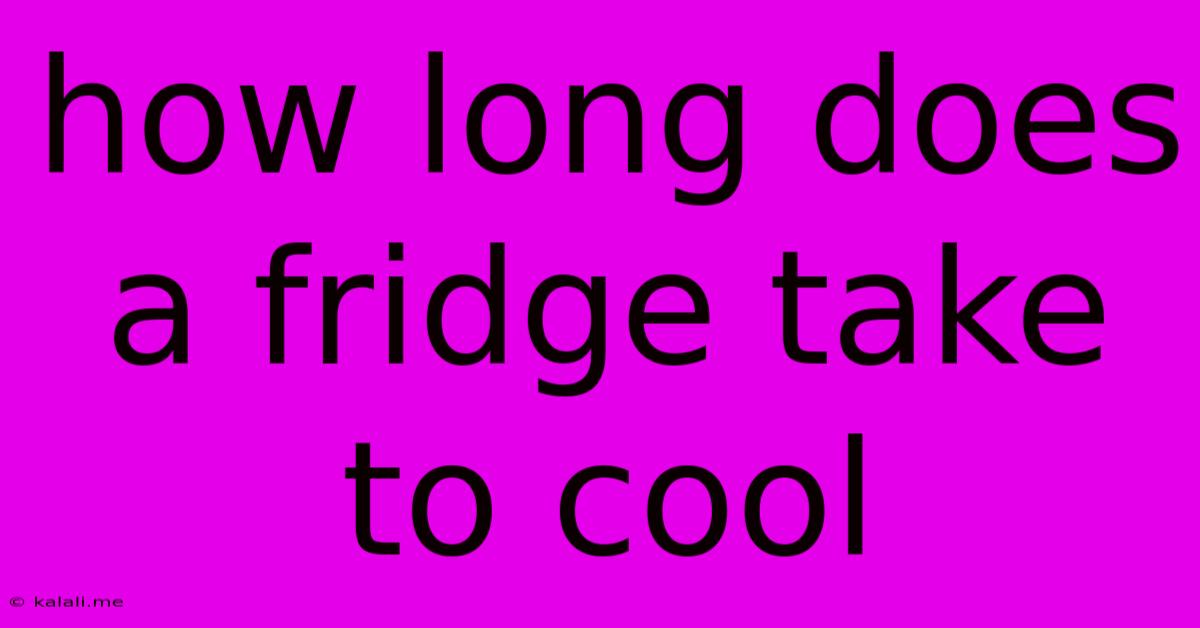How Long Does A Fridge Take To Cool
Kalali
May 31, 2025 · 3 min read

Table of Contents
How Long Does a Fridge Take to Cool Down? A Comprehensive Guide
Meta Description: Wondering how long it takes for your refrigerator to reach the optimal cooling temperature? This guide explores factors influencing cooling time, troubleshooting tips, and best practices for efficient fridge operation.
Getting your fridge to the right temperature is crucial for food safety and preserving the freshness of your groceries. But how long does this actually take? The answer isn't a simple number; it depends on several factors. This comprehensive guide will break down the process, helping you understand what influences cooling time and what to do if your fridge is taking too long to cool down.
Factors Affecting Fridge Cooling Time
Several variables determine how quickly your refrigerator reaches its optimal temperature:
-
Initial Temperature: A warmer fridge will naturally take longer to cool than one that's already close to the target temperature. If you've just plugged in a new fridge, or if your fridge has been unplugged for a while, expect a longer cooling period.
-
Ambient Temperature: The temperature of the room surrounding your refrigerator significantly impacts cooling time. A hotter room will require your fridge to work harder and longer to reach the set temperature.
-
Fridge Size and Model: Larger refrigerators with more interior space will naturally take longer to cool than smaller ones. The model itself, including its efficiency rating and compressor power, also plays a role. Newer, energy-efficient models often cool faster.
-
Amount of Food Inside: A fully stocked fridge will require more time to cool down than an empty one. This is because the food itself absorbs heat, slowing the cooling process. Avoid overloading your fridge, allowing for proper air circulation.
-
Door Openings: Frequent door openings allow warm air to enter, increasing the workload on your cooling system and prolonging cooling time. Minimize unnecessary openings to ensure efficient cooling.
How Long Should it Take?
While there's no single definitive answer, a generally well-functioning refrigerator should reach its set temperature (typically between 35-38°F or 1-3°C) within 2-4 hours of being plugged in or after a power outage. However, a fully stocked, larger fridge in a warm room could potentially take up to 6-8 hours.
Troubleshooting: My Fridge is Taking Too Long to Cool
If your fridge is consistently taking much longer than this to cool, consider these troubleshooting steps:
- Check the temperature settings: Ensure the thermostat is set correctly to the desired temperature.
- Inspect the seals: Check the door seals for any gaps or damage. A faulty seal allows warm air to enter, hindering cooling.
- Clean the condenser coils: Dust buildup on the condenser coils (usually located at the back or bottom) restricts airflow, reducing cooling efficiency. Regular cleaning is crucial for optimal performance.
- Examine the vents: Ensure that air vents inside and outside the refrigerator aren't blocked.
- Check the compressor: Listen for the compressor to run consistently. If it’s not running, or running infrequently, there may be a problem with the compressor itself, requiring professional repair.
Best Practices for Efficient Fridge Operation
- Maintain proper spacing: Allow adequate space around your refrigerator for optimal ventilation.
- Don't overload the fridge: Proper air circulation is key to efficient cooling.
- Keep the door closed: Minimize door openings to prevent warm air from entering.
- Clean regularly: Regular cleaning, including cleaning the condenser coils, will improve cooling efficiency.
By understanding the factors affecting cooling time and implementing these tips, you can ensure your refrigerator operates efficiently and keeps your food fresh and safe. If you're still experiencing issues, it's always best to consult a qualified appliance repair technician.
Latest Posts
Latest Posts
-
What Is Cud In The Bible
Jun 01, 2025
-
Car Heater Blows Hot Then Cold
Jun 01, 2025
-
Sum Of Two Uniform Random Variables
Jun 01, 2025
-
What Does U Stand For On A Circuti Board
Jun 01, 2025
-
How To Say Mommy In Japanese
Jun 01, 2025
Related Post
Thank you for visiting our website which covers about How Long Does A Fridge Take To Cool . We hope the information provided has been useful to you. Feel free to contact us if you have any questions or need further assistance. See you next time and don't miss to bookmark.